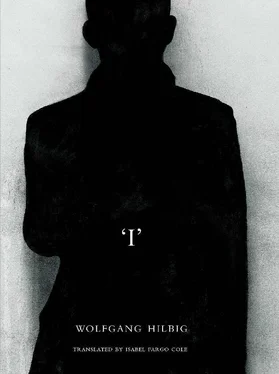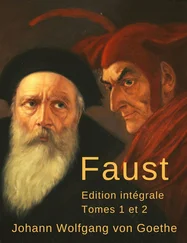He rose from the armchair, shook off the shards like drops of rain and raised the window blind. Light flooded in, for a moment so strong and glaring that he staggered back, blinded. — If everything had gone as planned, at the moment no one could know where he was. If anyone looked for him, at most it would be in Leipzig, presumably he hadn’t even told his mother about Berlin, all he’d ever mentioned was Leipzig. And he’d bought the tickets in Leipzig, Leipzig to Berlin and back; he’d always paid for the last stretch from Leipzig to A. separately — perhaps he’d managed to cover his tracks now.
The boss was not to be underestimated, of course, nor even the lanky guy. . but W. was prepared to claim — perhaps the dream had done this — that he was a different person since arriving in Berlin. If the boss cropped up, he’d calmly explain to him that he was set on living as a real writer now. . in fact, he was even grateful to him, the boss, for the salutary impulse, for the inspiration. All right, earlier he’d given a different impression. . since coming to Berlin he felt new-born. — The anticipated reply was utterly indifferent: Newborn? What mystical rubbish!
(But when he thought about it, that sort of reply wasn’t typical of the boss. It was much more like a later, younger arrival — little older than W. — who banked on objectivity. This arrival had introduced himself in the stairwell: Sorry . . I’m Feuerbach!)
He was grateful to the boss for a very literary idea: one of his characters had hit on the notion of determining the time of his own birth. This character had unexpectedly landed in a big city, where he suddenly experienced himself as a synthesis — after the first spring shower which came in the night, after a downpour which cleared the air of the character’s memories of his former life in far remote territories inexorably falling to ruin. So as not to be guilty of drawing utterly transparent analogies to his terminated reality, W. had rendered his fictional figure’s memories as a kind of troglodyte existence. His character had vegetated in the rooms of a bunker complex, a legacy of the last war which no one else knew about. This complex was situated beneath an expanse of ruins that lay in a depression between the outskirts of town and large swathes of forest that rose uphill towards the east. . of course this setting was also taken from reality, but at least it was improbable, W. said to himself, and it seemed sufficiently abstruse that his character would visit the city only at night, when he crept out from his caves. And hour after hour this monster listened to a language which he couldn’t understand, which was nothing but gibberish for him, beneath the illuminated windows of the houses, where he stared from the dark into the light. . and stared anxiously at the gestures that aimed towards the outside, seemingly at him. Those inside had no patience with the outcasts who stood eavesdropping in the cold, no compassion for the phantoms whose heads loomed from the fog into the beams of light, for the shadows out there sniffing at the cracks of the doors. .
At this point he stopped and asked himself whether anyone who knew anything about his past wouldn’t immediately identify him as the ghost he was describing. But who could possibly know anything? He himself knew virtually nothing. And hadn’t this phantom always lived solely in his papers, even back in the town?. . This was the thought that had to be saved: his earlier life was a paper fantasy and had to stay that way; all other thoughts had to be silenced one by one. It couldn’t be said too often: that I from back then was a literary character. . and according to a not-unfounded hypothesis, the boss concurred with this point of view!—W.’s memories were sufficiently telling: ‘I’, raising his head again and again from the tabletop. . and when the light of the kitchen lamp begins to seep into his brain and reality regains its foothold in his thoughts, the question looms inescapably: Where was I just now? — What is the place from which I’ve just returned. . which streets had he roamed, in the light of which window had he crept up to hold his ear to the private parts of strangers’ voices. . ah, they’d all remained equally blurry, these private voices in the fog. — The question was nonsensical, his skull had merely slept amid a dense fog of letters (Was that so? Yes , the boss would have replied). . forehead bedded in a thick layer of papers, buried by a whirl of words and phrases, delivered up one winter long to the voices of his imagination. .
The question was nonsensical. . it was only in his stories that he’d eavesdropped on them all! And he’d never eavesdropped on himself! Now it was time. . now he could eavesdrop on this spy, this product of his text fragments, now he could pursue this draft of himself that had seized his essence, this sleeper roaming the fog at the outskirts of town in his sleep, betrayed by sleep all winter long, the phony panting of the papers in his ears. .
Now and then the doorbell rang. . and each time he was too feeble to get up and see who’d rung. Just once he’d gotten up, gathered the interrupted manuscript from the desktop, folded it several times to form a slim, longish bundle, and stuffed it into the crack between the cushions of the red armchair, the narrow, deep hiding place between the back and the seat. . after all that, the ringing had already stopped; he’d lurked to see if it would return, but nothing came. . in the evening he fell asleep and woke with a start — the ringing had returned. . he was just hearing things. — The room’s bed was a so-called daybed, red plush, just as greasy as the red armchair; it cost him an effort to ignore the dark, slightly sticky streaks which marred the daybed’s edges (of course this sleeping fixture had constantly been used without a sheet), so he slept in the armchair whenever possible, his feet stuck out over the seat of the wooden chair he placed in front of it, usually fully dressed, which wasn’t a problem for him (he’d slept that way often enough during his night shifts in the boiler room) as he’d acquired the habit of consuming large quantities of alcohol in the first half of the night while trying to write. And he slept in a similar position on the daybed: on his side, stabilized by the seated pose, his head tilted back on a pillow, his lower arms crossed over his chest or clamped between his thighs, his legs bent and sometimes drawn up nearly to his stomach; this, he fancied, was almost the shape of a foetus about to slip from the womb (it was no wonder, he said to himself, that he was plagued by dreams of childbirth). . and each time the ringing signal at the door sent him back into this irresolute posture, or he doubled up still further; his first thought was always that the lanky guy was leaning on the doorjamb outside. . it was as though his earlier life were ringing at his door. — Regularly it was a single ring, not repeated, and thus typical of the ‘probationer’, the gutless wonder (or so his boss had characterized him). . at the start of his time in Berlin W. hadn’t been able to shake the strange sense that the lanky guy would crop up one day; it would be a miracle if he didn’t, he said to himself. — For some reason the longlegs was the bogeyman of the game, precisely because he looked so harmless at first glance. . he was the bringer of bad news. . this clearly gave even his boss the willies. Fear was a vital factor in this show, it always had to be available in sufficient quantities — and it could change hands very quickly.—W. had thought about making the ‘probationer’ a background character in his story, one who could crop up unexpectedly at any time. . in his mind’s eye he saw the lanky guy looming over a dense congregation of people, for instance, on a bridge over the S-Bahn rail tracks, and the sun transformed the tall thin figure into a smoke-coloured silhouette, for the interim. . till the time had come for this overlong shadow to stick to the narrator’s heels. .
Читать дальше












